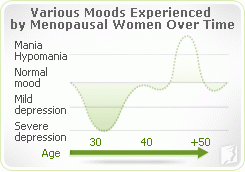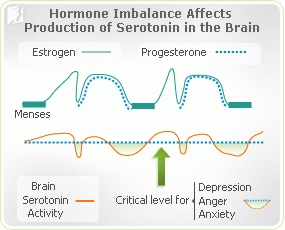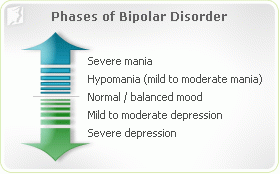Image Credit: www.shutterstock.com
Menopause can not only prompt uncomfortable physical symptoms, it can also turn a woman´s emotions into an out-of-control pendulum by afflicting her with mood swings. Menopause is a time of significant hormonal changes, and these changes, typically occurring in women between the ages of 45 and 55, can affect emotional stability just as much as the body´s equilibrium. More than50% of women experience mood swings as they approach menopause. Fortunately, there are ways to manage mood swings during this transitional time.
|
Women who experienced PMS or post partum depression are more likely to experience mood swings during menopause.
|
Continue reading to learn all about mood swings, their causes, risk factors, extreme cases, and finally, treatment options.
About Mood Swings
Mood swings are defined as extreme or abrupt fluctuations in mood. During mood swings, people often experience drastic shifts in their emotional state. The term "mood swing" is often used to describe an emotional reaction that is inappropriate to its cause or trigger.
During menopause, women commonly experience mood swings because theirhormones, which regulate mood and emotions, are thrown off balance. Though this is a common and normal symptom of menopause, it can be a very troubling phenomenon. It is often helpful for women going through mood swings to understand the symptoms of this condition. Please read on to learn more about how mood swings can manifest during menopause. Symptoms of Mood Swings
Because each woman has her own individual way of managing her emotions, stress, and her environment, all women experience the symptoms of mood swings differently. However, many symptoms of mood swings are common for women going through menopause.
|
Mood Swings Overview
Definition
Symptoms
Hormonal
Other menopause causes
Psychological
Behavioral
Health related
Bi-polar
Depression
Anxiety
|
 |
Common Symptoms of Mood Swings:
|  |
Being aware of these symptoms can help a woman develop a better perspective on mood swings. Now, with a clear understanding of what mood swings are, it´s time to learn about the underlying causes of them to become better equipped to deal with and treat mood swings. Click the following link to read more about mood swings, or continue reading to learn about the causes of mood swings.
|
Up to 75% of women going through menopause suffer from mood swings.
|
Causes of Mood Swings
Mood swings during menopause are caused largely by the hormonal transitions women go through during this time. Hormones, such as estrogen, influence the production of serotonin, which is a mood regulating neurotransmitter.
However, there are other causes of mood swings. Other menopause symptoms such as hot flashes, night sweats, physical changes, and fatigue can cause or intensify mood swings, but these symptoms are generally caused by hormonal imbalance as well. |  |
1. Hormonal Causes of Mood Swings
Medical researchers have found that estrogen seems to play a large role in the brain's production of serotonin, also known as the mood regulating neurotransmitter.
Estrogen´s Effects on Serotonin:• Increases serotonin receptor sensitivity • Increases serotonin receptor levels • Increases serotonin production |
Because perimenopausal hormone imbalances temporarily disturb serotonin production in the brain, there is an increased chance of mood swings, depression, and other psychological disturbances during menopause.
|
While hormonal imbalance is thought to be a major underlying cause of mood swings during menopause, experts also point out that mood disturbances may be caused by other menopausal symptoms.
Keep reading to find out how other menopausal symptoms can affect mood and emotion.
Keep reading to find out how other menopausal symptoms can affect mood and emotion.
2. Other Menopausal Causes of Mood Swings
Doctors believe that mood swings are often the result of other menopausal symptoms. Women in their 40s and 50s, often stretched already by work and home stresses, suffer fatigue, sleep problems, hot flashes, and other symptoms that can directly contribute to problems with mood and emotion.
| Menopausal Causes of Mood Swings:• Night sweats • Hot flashes • Physical changes • Fatigue |
Click the following link to read more about the causes of mood swings, or continue reading below to find out the risk factors of mood swings.
Risk Factors for Mood Swings
Why are some women more prone to mood swings during menopause? The answer, though complicated, has much to do with a woman's chemistry, her environment, and other factors. In addition to the hormonal causes of mood swings, severalpsychological, behavioral, and health related factors can increase the likelihood that a woman will develop mood swings during menopause.
Psychological factors:• Past mental illness • Stress • Past trauma • Relationship issues • Coping with change | Behavioral factors:• Smoking • Alcohol • Poor diet • Inadequate exercise • Stimulant use | Health factors:• Diabetes • Early menopause • Heart disease • Sleep disorders • Cancer • Lupus • Thyroid disease |
Click the following link to read more about risk factors for mood swings, or continue below to learn about extreme cases of mood swings and when to see a doctor.
Extreme Cases of Mood Swings
While mood swings are normal during menopause, emotional and mood related symptoms might indicate a more serious condition. Mood swings that are extreme, last for an extended duration, or put a woman or others at risk of harm might warrant professional help. To learn more about when to seek help for mood swings, please read on about the symptoms of bipolar disorder, clinical depression, and anxiety.
Extreme case 1: Bipolar Disorder
Bipolar disorder, also called manic-depressive disorder, is a group of mood disorders, characterized by the presence of one or more episodes of mania, or abnormally elevated mood, and alternating episodes of depression, or prolonged low moods.
|  |
Extreme case 2: Depression
Depression, termed major-depressive disorder, is another condition more serious than mood swings for which professional help is often necessary. While many people experience the symptoms of depression at different times in their lives, clinical depression is more than a temporary state or a symptom of menopause.
Extreme case 3: Anxiety
Anxiety is another condition more serious than menopause-induced mood swings. Anxiety disorders affect up to 18% of US adults, making this the most common type of mental illness. Clinical anxiety is a group of disorders and fobias that includes the following at the right box:
| Disorders of clinical anxiety:• Generalized Anxiety Disorder • Obsessive-Compulsive Disorder • Post Traumatic Stress Disorder • Social Phobia • Panic Disorder |
Fortunately, excellent help is available for women who experience psychological conditions more serious than mood swings. Most women who go through menopause will not develop such symptoms. If concerned about mood swings or other symptoms during menopause, it is wise to speak with a qualified health professional.
Click the following link to learn more about the extreme cases of mood swings, or continue reading below to find out what are some of the best treatment options available for mood swings.
Click the following link to learn more about the extreme cases of mood swings, or continue reading below to find out what are some of the best treatment options available for mood swings.
Treatments for Mood Swings
When exploring treatments for mood swings, it´s important to begin with methods that are the least obtrusive, with the least likelihood of side effects, and progress from there.
This means that lifestyle changes are the best place to begin. For instance, sometimes mood swings can be alleviated simply by getting enough sleep and maintaining a healthy diet rich in nutrients.
This means that lifestyle changes are the best place to begin. For instance, sometimes mood swings can be alleviated simply by getting enough sleep and maintaining a healthy diet rich in nutrients.
Typically, combining lifestyle changes and alternative medicines will produce the best treatment results. Alternative medicines can be different herbs and supplements, or even techniques like acupuncture. When seeking out alternative medicines, keep in mind that because mood swings during menopause are associated with hormonal imbalance, look for supplements that bring a natural balance to hormonal levels, for this will go a long way to treating mood swings at the core of the issue.
|  |
Finally, if still experiencing digestive problems, there are different drugs and surgeries that can be explored. Drugs are often prescribed simply to cope with mood swings but do not offer a cure. This final option comes with the most risk and side effects.
Click the following link to learn specific treatments for mood swings, which begin with lifestyle changes, move onto alternative medicines, and finally, if those options don´t seem to help, drugs and surgery. The most affective treatments for mood swings typically combine lifestyle changes and alternative medicines.
Click the following link to learn specific treatments for mood swings, which begin with lifestyle changes, move onto alternative medicines, and finally, if those options don´t seem to help, drugs and surgery. The most affective treatments for mood swings typically combine lifestyle changes and alternative medicines.
Article Credit: http://www.34-menopause-symptoms.com


No comments:
Post a Comment